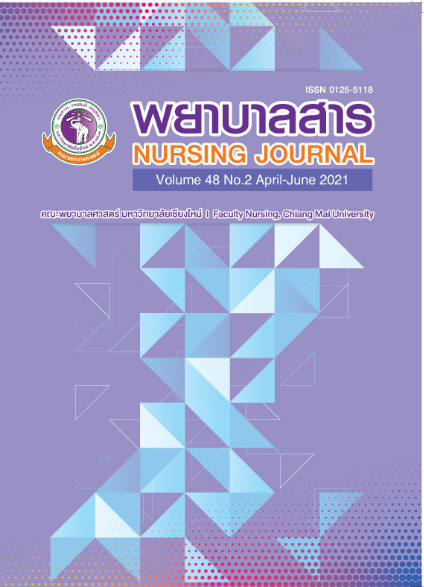ภาระการดูแลและคุณภาพชีวิต ของผู้ดูแลผู้สูงอายุที่ได้รับการล้างไตทางช่องท้องแบบต่อเนื่อง
คำสำคัญ:
คุณภาพชีวิต, ภาระการดูแล, ผู้ดูแล, ผู้สูงอายุ, การล้างไตทางช่องท้องแบบต่อเนื่องบทคัดย่อ
ผู้ดูแลเป็นบุคคลที่มีความสำคัญเป็นอย่างมากที่ให้การช่วยเหลือ และสนับสนุนดูแลผู้สูงอายุ
ที่ได้รับการล้างไตทางช่องท้องแบบต่อเนื่อง โดยเฉพาะอย่างยิ่งในผู้สูงอายุที่มีความสามารถทางด้านร่างกายลดลง การศึกษาครั้งนี้เป็นการวิจัยเชิงพรรณนาหาความสัมพันธ์ มีวัตถุประสงค์เพื่อศึกษาภาระการดูแล คุณภาพชีวิต และความสัมพันธ์ระหว่างภาระการดูแลกับคุณภาพชีวิตของผู้ดูแลผู้สูงอายุที่ได้รับการล้างไตทางช่องท้องแบบต่อเนื่อง กลุ่มตัวอย่างเป็นผู้ดูแลผู้สูงอายุที่ได้รับการล้างไตทางช่องท้องแบบต่อเนื่องที่เข้ารับการรักษาที่โรงพยาบาลมหาราชนครเชียงใหม่ โรงพยาบาลสันป่าตอง และโรงพยาบาลสันทราย จำนวน 155 คน ระหว่างเดือน พฤศจิกายน 2559 ถึงเดือนเมษายน 2560 คัดเลือกกลุ่มตัวอย่างแบบเฉพาะเจาะจงตามคุณสมบัติที่กำหนด เครื่องมือที่ใช้ในการเก็บรวบรวมข้อมูลประกอบด้วย แบบบันทึกข้อมูลส่วนบุคคล แบบสอบถามภาระการดูแลของซาริท และคณะ ดัดแปลงโดย ชนัญชิดาดุษฎี ทูลศิริ, รัชนี สรรเสริญ, และ วรรณรัตน์ ลาวัง (Toonsiri, Sunsern, & Lawong, 2011) และแบบสอบถามคุณภาพชีวิตขององค์การอนามัยโลกฉบับย่อที่แปลและดัดแปลงโดย สุวัฒน์ มหัตนิรันดร์กุล และคณะ (Mahatnirunkul et al., 1997) ตรวจสอบความเชื่อมั่นของเครื่องมือโดยใช้สัมประสิทธิ์อัลฟาของครอนบาค (cronbach’s alpha coefficient) ได้ค่าสัมประสิทธิ์ของแอลฟาเท่ากับ .90 และ .80 ตามลำดับ วิเคราะห์ข้อมูลโดยใช้สถิติเชิงพรรณนาและสัมประสิทธิ์สหสัมพันธ์เพียร์สัน (Pearson correlation)
ผลการวิจัยพบว่า ภาระการดูแลของผู้ดูแลผู้สูงอายุที่ได้รับการล้างไตทางช่องท้องแบบต่อเนื่องอยู่ในระดับน้อย ( = 20.72 ± 13.82) คุณภาพชีวิตของผู้ดูแลผู้สูงอายุที่ได้รับการล้างไตทางช่องท้องแบบต่อเนื่องอยู่ในระดับดี ( = 96.86 ± 12.05) และภาระการดูแลมีความสัมพันธ์ทางลบกับคุณภาพชีวิตของผู้ดูแลผู้สูงอายุที่ได้รับการล้างไตทางช่องท้องแบบต่อเนื่องในระดับปานกลางอย่างมีนัยสำคัญทางสถิติที่ .001 (r = -.46)
พยาบาลควรให้ความสำคัญกับการสนับสนุน และช่วยเหลือผู้ดูแลผู้สูงอายุที่ได้รับการล้างไตทางหน้าท้องแบบต่อเนื่อง เพื่อให้ผู้ดูแลผู้สูงอายุที่ได้รับการล้างไตทางช่องท้องแบบต่อเนื่องมีคุณภาพชีวิตที่ดียิ่งขึ้นต่อไป
เอกสารอ้างอิง
841-850.
Avsar, U., Avsar, U. Z., Cansever, Z., Set, T., Cankaya, E., Kaya, A., . . . Keles, M. (2013). Psychological and emotional status, and caregiver burden in caregivers of patients with peritoneal dialysis compared with caregivers of patients with renal transplantation. Transplantation Proceedings, 45(3), 883-886. doi:10.1016/j.transproceed.2013.03.004.
Belasco, A., Barbosa, D., Bettencourt, A. R., Diccini, S., & Sesso, R. (2006). Quality of life of family caregivers of elderly patients on hemodialysis and peritoneal dialysis. American Journal of Kidney Diseases, 48(6), 955-963.
Belasco, A. G., & Sesso, R. (2002). Burden and quality of life of caregivers for hemodialysis patients. American Journal of Kidney Diseases, 39(4), 805-812.
Chuasuwan, A., Praditpornsilpa, K. (2013). Thailand renal replacement therapy year 2013. Bangkok: The Nephrology Society of Thailand. (In Thai)
Hurst, H., & Figueiredo, A. E. (2015). The needs of older patients for peritoneal dialysis: Training and support at home. Peritoneal Dialysis International, 35(6), 625-629.
Kanjanabuch, T., Tanisaro, T., Chulakadabba, A., & Eiam-Ong, S. (2008). CAPD apparatus, access devices, implantation techniques and surgical complications. In A Eiam-Ong, S., Tungsanga, K., Jittinun, A., Kanjanabuch, T., Lumlertgul, D., & Thanakitcharu, P (Ed.). Textbook of Peritoneal Dialysis (pp.133-188). Bankok: Text and Journal Publication.
(In Thai)
Klinsuwan, R., Watthayu, N., & Suwonnaroop, N. (2017). Factors predicting quality of life in family caregivers among patients receiving continuous ambulatory peritoneal dialysis. Journal of Nursing Science Chulalongkorn University, 29(1), 51-66. (In Thai)
Kolyanee, A., Dangdomyouth, P., & Aumtanee, A. (2015). Selected factors relating to quality of life among caregivers caring for patients with schizophrenia at home. Journal of The Police Nurse, 7(1), 130-140. (In Thai)
Khatta, N., Hanprasitkam, K., & Siripitayakunkit, A. (2018). Relationships among selected factors, caregiving burden, and quality of life of caregivers of persons undergoing continuous ambulatory peritoneal dialysis. The Journal of Baromarajonani Collenge of Nusing, Nakhonratchsima, 24(2), 108-129. (In Thai)
Krejcie, R.V. & Morgan, D. W. (1970). Determining sample size for research activities. Educational and Psychological Measurement, 30, 607-610.
Kunyodying, T., Pothiban, L. & Khampolsiri, T. (2015). Dependency of the elderly with stroke, caregiver burden, social support, and quality of life among older caregivers. Nursing Journal, 42, 107-117. (In Thai)
Liyanage, T., Ninomiya, T., Jha, V., Neal, B., Patrice, H. M., Okpechi, I., . . . Perkovic, V. (2015). Worldwide access to treatment for end-stage kidney disease: A systematic review. The Lancet, 385(9981), 1975-1982.
Mahatnirunkul, S., Tuntipiwathanasakul, W., Pumpisal, W., Wongsuwan, K., & Pornmanarungkul, R. (1997). Comparison of the WHOQOL-100 and the WHOQOL-BREF (26 items). Chiang Mai: Suanprung Psychiatric Hospital Department of Mental Health Ministry of Public Health. (In Thai)
Papastavrou, E., Andreou P., Middleton N., Papacostas, S., & Georgiou, I. K. (2014). Factors associated with quality of life among family members of patients with dementia in Cyprus. International Psychogeriatrics, 26(03), 443-452.
Preechapongmit, K., Lamchang, S. & Jintrawet, U. (2012). Factor related to caregiving burden among caregivers of children with asthma. Nursing Journal, 39(4), 13-22. (In Thai)
Sayin, A., Mutluay, R., & Sindel, S. (2007). Quality of life in hemodialysis, peritoneal dialysis, and transplantation patients. Elsevier Journal, 39(10), 3047-3053.
Shah, H. B. U., Atif, I., Rashid, F., Babar, M. W., Arshad, F., Qamar, W., . . . Qadir, M. L. (2017). Assessment of caregiver burden of patients receiving dialysis treatment in Rawalpindi. The Journal of the Pakistan Medical Association, 67(10), 1498.
Shimoyama, S., Hirakawa, O., Yahiro, K., Mizumachi, T., Schreiner, A., & Kakuma, T. (2003). Health-related quality of life and caregiver burden among peritoneal dialysis patients and their family caregivers in Japan. Peritoneal Dialysis International, 23(Supplement 2), S200-S205.
Sindhu, S., Varitsakul, R. & Sriyuktasuth, A. (2011). Factors associated with depression in elderly peritoneal dialysis patients. Journal Nurse Science 2011. 29, 84-92. (In Thai)
Srivanichakorn, S. (2013). The integrated research program on the holistic care model development for the elderly, final report. Nakhon Pathom: ASEAN Institute for Health Development Mahidol University. (In Thai)
Thanakitcharu, P. (2015). Current situation of chronic kidney disease in Thailand. Journal of the Department of Medical Service, 40(5), 5-18. (In Thai)
Thitiarchakul, S. (2008). Peritoneal dialysis: Peritoneum anatomy. In A Eiam-Ong, S., Tungsanga, K., Jittinun, A., Kanjanabuch, T., Lumlertgul, D., & Thanakitcharu, P (Ed.). Textbook of Peritoneal Dialysis (pp.101-114). Bankok: Text and Journal Publication Co., Ltd. (In Thai)
Toonsiri, C., Sunsern, R. & Lawang, W. (2011). Development of the burden interview for caregivers of patients with chronic illness. Journal of Nursing and Education, 4(1), 62-75. (In Thai)
World Health Organization. (1996). WHOQOL-BREF, Introduction, administration, scoring and generic version of the assessment, field trial version. World Health Organization Geneva.
Yodpech, S. (2004). Caregiver of older persons: The synthesis of knowledge. Bankok: Faculty of Social Administration, Thammasat University. (In Thai)
Zarit, S. H., Reever, K. E., & Bach-Peterson, J. (1980). Relatives of the impaired elderly: Correlates of feelings of burden. The gerontologist, 20(6), 649-655.
ดาวน์โหลด
เผยแพร่แล้ว
รูปแบบการอ้างอิง
ฉบับ
ประเภทบทความ
สัญญาอนุญาต
ลิขสิทธิ์ (c) 2021 พยาบาลสาร

อนุญาตภายใต้เงื่อนไข Creative Commons Attribution-NonCommercial-NoDerivatives 4.0 International License.
บทความที่ได้รับการตีพิมพ์เป็นลิขสิทธิ์ของวารสารพยาบาลสาร
ข้อความที่ปรากฏในบทความแต่ละเรื่องในวารสารวิชาการเล่มนี้เป็นความคิดเห็นส่วนตัวของผู้เขียนแต่ละท่านไม่เกี่ยวข้องกับมหาวิทยาลัยเชียงใหม่ และคณาจารย์ท่านอื่นๆในมหาวิทยาลัยฯ แต่อย่างใด ความรับผิดชอบองค์ประกอบทั้งหมดของบทความแต่ละเรื่องเป็นของผู้เขียนแต่ละท่าน หากมีความผิดพลาดใด ๆ ผู้เขียนแต่ละท่านจะรับผิดชอบบทความของตนเองแต่ผู้เดียว






